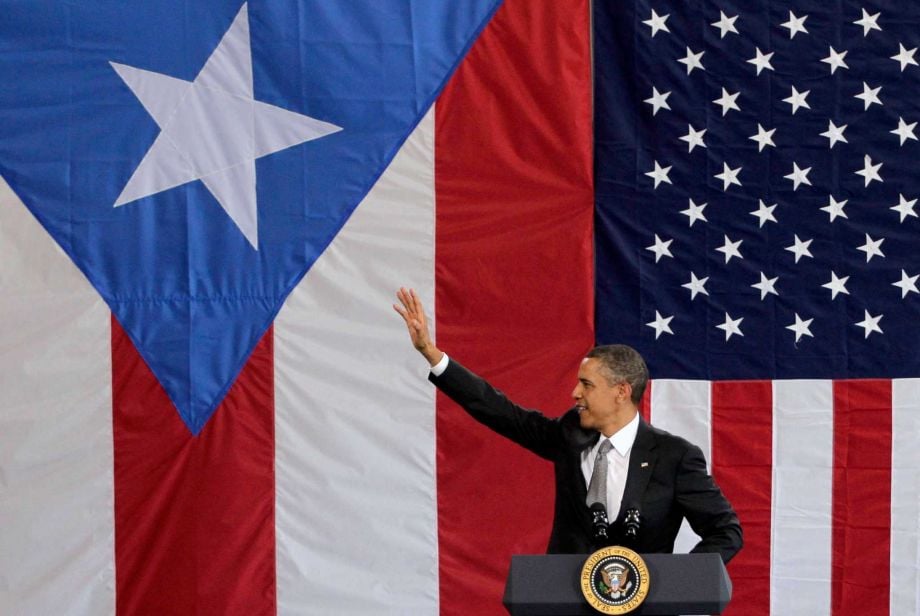
President Obama during his visit to Puerto Rico in 2011. (Brennan Linsley, STF)
By Matthew Barbari
Since 1898, the United States and the small Caribbean island of Puerto Rico have shared an interesting relationship. Puerto Rico remains a U.S. territory and is subject to the authority of Congress, while maintaining its own local government. This unique arrangement between the two has lasted since the United States defeated the Spanish forces in the Caribbean following the Spanish-American War. Indeed, Puerto Rico’s status as a commonwealth is one of the few remaining vestiges of the U.S. colonial expansion during the early 20th century.
Recently, this relationship has been called into question as Puerto Rico faces a looming debt crisis that could set the island’s economy back by more than a decade. This issue has been taken up by the U.S. Congress, who seek to pass a law that would help prevent Puerto Rico from becoming bankrupt, while also avoiding a bailout with taxpayers’ money. As Congress debates how to handle the imminent crisis, it is important to step back and take some time to examine the future of U.S.-Puerto Rico relations.
Government spending in Puerto Rico has entirely decoupled from the island tax revenues, leading to a swelling debt estimated at around $70 billion. While Puerto Rico has already defaulted on a $221 million loan, there is an upcoming bond payment for $422 million on May 1st that the country also seems unable to repay. Puerto Rico’s status as a commonwealth does not allow it to file for chapter 9 bankruptcy under U.S. law, which does not grant full constitutional rights to U.S. territories (known as the Insular Cases).
The Puerto Rican Government Development Bank (GDB) has been spending money on infrastructure projects that have been costly to an island nation of some 3.5 million, of which 14% are unemployed. This, coupled with a massive migration outflow from Puerto Rico to mainland U.S., has left the burden of debt to be carried by the few that remain.
This dramatic situation has led the U.S. Congress to begin debating over the Puerto Rican Oversight, Management and Economic Stabilization Act, known as PROMESA. The act plans to create a financial oversight committee for the island (similar to the one that was set up for the District of Columbia in 1995) that would help to restructure Puerto Rico’s economy and solve its massive debt crisis. PROMESA has been championed by House Speaker Paul Ryan, who has until May 1st to get the law passed before Puerto Rico’s next default.
PROMESA is not a bailout, nor is it a law that would grant Puerto Rico the ability to file for bankruptcy. It is instead a bill that looks to work with the government of Puerto Rico to repay the loans and enforce fiscal responsibility on the island. The PROMESA bill also has the support of Puerto Rican Governor Alejandro Garcia Padilla, who rejected an earlier proposal from Congress as he felt it would strip away too much power from the Puerto Rican government.
Many Americans may wonder why the U.S. Congress is handling the Puerto Rican economic crisis, while some may also question how this has an impact on the American public. First, as a provision of Puerto Rico’s status as a U.S. territory, it is subject to Congress. Moreover, Puerto Ricans were granted U.S. citizenship in 1917 under the Jones-Shafroth Act, which means that, it is the responsibility of Congress to develop a solution to their issues—like the bailouts of American banks during the Economic Crisis in 2008 or President Roosevelt’s New Deal policies during the Great Depression.
Beyond managing the current crisis, the U.S. should also reexamine its relationship with the island. Puerto Rico has long been an outlier—while it is technically a sovereign nation not subject to the U.S. constitution, many of its political activities are dictated by the U.S. government. In multiple occasions, the government of Puerto Rico has held referendums over whether it should retain in its current status, or change, either to an independent nation or join the U.S. as the 51st state. The most recent referendum in 2012 showed that more than half of Puerto Ricans want to end their status as a commonwealth, but are more divided as to which status they would like to attain (either statehood or nationhood).
While there are some who suggest the U.S. simply “cut Puerto Rico loose” to avoid dealing with their economic woes, this would set a bad precedent for U.S. foreign policy going forward, as it would appear that the U.S. will dump any ally it has at the first sign of economic or political trouble. This would be especially damaging, as it is one of its own territories. While the most pressing issue is resolving the debt crisis, in the long-run the U.S. must look objectively at Puerto Rico and judge whether to modify its status or not.